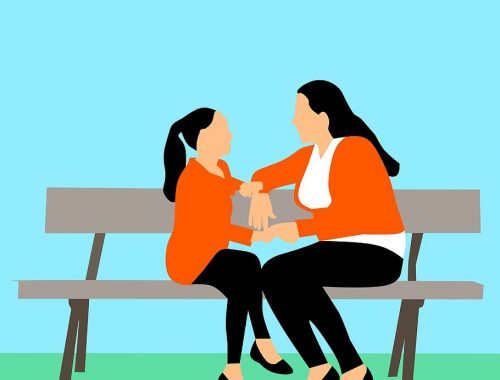
How To Cope With Grief Healthily
Grief is often quite intense and long-lasting and occurs on many levels from emotional and physical to social and spiritual. Especially in the early stages, people who are grieving often describe feeling overwhelmingly sad and distraught, although grief may also manifest emotionally as “numbness” or feeling “disconnected.”
What Causes Grief?
Grief is almost always triggered by the loss of someone or something very valuable or loved. Traditionally, we associate grief with the death of a loved one. And indeed, this is a common cause for grief. But any significant loss can lead to grief: loss of a job, divorce/ separation, being diagnosed with a major illness, losing a beloved pet.
In short, grief doesn’t have to be about death and it doesn’t have to involve another person. It doesn’t even have to be “big” or even what most people would consider significant. If you lose something that’s valuable to you, it’s natural to experience grief.
Grief is a highly individual process, as unique as the people experiencing it. Everything from our personal histories and culture to personality traits and temperament affects how we experience and cope with major loss in our life. What follows are 6 suggestions to help you think about and navigate your own grieving process in a compassionate, constructive, and healthy way.

1. Don’t put time-limits on your grief.
Most of us understand that grief is normal and inevitable after a major loss. But the duration of grief is not as well understood. Many people think that it should last for a year but no more. Some people think it may last for a while but should feel much easier after the first couple weeks.
Unfortunately, there’s no way to know how long your grief “should” last. It’s important to acknowledge this inherent uncertainty instead of fighting against it by putting artificial deadlines on your grief, which often backfire. Grief does lessen with time, but how quickly and to what extent is difficult to predict.
2. Resist comparing your grief to other people’s.
In the age of Instagram and Dr. Google, it’s all-to-easy to compare our grief and the grieving process to that of other people. This impulse to compare and contrast our grief with others is natural. We’re social creatures and we crave the knowledge that what we’re experiencing isn’t completely foreign or outside the norm.
Which means it’s not surprising when we find ourselves wishing we could get on with life as quickly as our sister-in-law did. Or wondering why our co-worker was able to so quickly bounce back after being laid off and start applying for new jobs. But the act of comparing our grief to that of others and then judging it accordingly usually isn’t helpful. Grief is complex. And complexity doesn’t lend itself well to superficial comparisons.
3. Spend time grieving intentionally.
This one sounds strange, but it’s based on a key idea in the mechanics of emotion: What we resist, persists. When our mind see us fighting with or running away from something (including an emotion like sadness, for example), it learns to see that thing as a threat. Which means the next time something triggers your sadness, your mind is going to go on high alert, increasing your anxiety and overall level of emotion.
Trying to avoid difficult emotions only makes them stronger in the long-run.
But if you flip this idea on its head, it leads to a counter-intuitive but powerful solution: By deliberately approaching difficult emotions like sadness, we can train our brain to become more comfortable with them. And while the pain of sadness will always be there, it’s a lot easier to work through and bear when it’s not also overburdened with fear, shame, frustration, and all sorts of other difficult feelings that come from training our minds to think of sadness as dangerous.
4. Seek out the right kind of social support.
The idea that you should seek out social support during grief is one of the most common pieces of advice out there for processing grief. It’s also one of the most misunderstood. The key mistake people make is that they assume social support means talking to other people specifically about your grief or loss:
-
Joining a support group.
-
Long, emotionally draining conversations with loved ones.
-
Seeing a professional counsellor or therapist.
And while deliberately talking about and sharing your grief can be helpful for some people at certain stages, that’s not the only way to get social support while you’re grieving. Simply being connected is what’s important during grief.
5. Allow yourself you feel more than just sadness.
A common pattern seen among people who struggle with grief is that they believe it’s somehow wrong or unnatural to feel anything other than sorrow and sadness. But these rigid demands and expectations for their emotional lives often end up magnifying their suffering. By limiting our grief exclusively to sadness, we end up invalidating the emotionally complex nature of grief.
Remember, grief is a response to significant loss. And while sadness is often a large or even dominant part of our emotional reaction to loss, it’s almost never the only one:
-
It’s okay to feel happy and even joyful at times during the grieving process.
-
It’s okay to feel angry and disappointed, even if you feel those toward a person you’ve lost.
-
It’s okay to feel afraid or anxious about your future as a result of your loss.
In short, it’s okay to feel anything when you’re grieving. And while many of the emotions we feel are difficult or even painful, it’s important to acknowledge and validate all of them as legitimate and natural. Healthy grief means embracing the full range of emotions it contains with compassion and understanding.

6. Take self-care seriously.
An underappreciated part of healthy grieving is taking care of yourself, especially your body. When loss and grief strike, your life is understandably thrown into disarray and disorder. From legal and logistical issues to social and emotional changes, grief can be chaotic. Unfortunately, amid the chaos and confusion of grief, many people let go of healthy habits and routines they normally engage in. Ironically, this makes it harder to navigate your grief well.
It’s natural during times of grief to have our focus dominated by thoughts of the person or things we’ve lost. But try your best not to let your attention and energies be totally dominated by it. If you’re going to grieve well, you need a solid foundation of self-care, especially diet, exercise, and sleep. You can’t grieve well if you don’t take care of yourself.
What is Grief Therapy or Grief Counselling?
While grief is a normal and healthy phenomenon, many people find it helpful to work with a therapist or counsellor, especially during the early stages of their grief. A grief counsellor (or therapist) is simply a professional who specializes in helping people think about and work through the many difficulties associated with loss and grief. While they may have specific recommendations or resources, they mostly help by providing safe space and compassionate ear for you do discuss and work through your grief.
Grief counselling is especially beneficial is you feel like you don’t have anyone else in your life you can talk to about your loss and how you’re grieving. Importantly, grief counselling can be a relatively brief process, perhaps just a few sessions or a couple months worth of visits. Of course, it could also be longer if you want, but it doesn’t have to be.
You May Also Like

5 Tips To Find Inner Peace
2022-12-08
Understanding Psychological Disorders
2021-10-20

